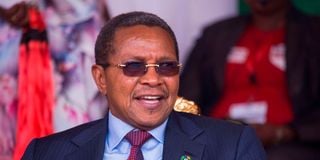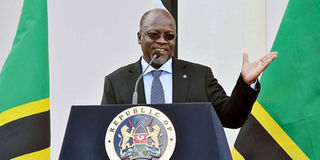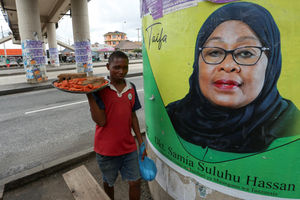
President Samia Suluhu Hassan of Tanzania casts her vote at Chamwino village office polling station in Dodoma on election day on October 29, 2025.
For decades, Tanzania stood as a quiet pillar of African stability. While its neighbours burnt through coups and contested elections, Tanzania projected calm — a nation born of consensus, nurtured in humility, and bound together by Julius Nyerere’s vision of unity. Today, that image is in ruins.
The country that once called itself the “beacon of peace” is now a nation of curfews and funerals. Human rights groups estimate that more than 700 people have died in post-election violence, mostly on the mainland. Hundreds more remain missing or detained without trial. Streets that once echoed with the rhythms of commerce now murmur with fear.
For many mainlanders — residents of what was once Tanganyika — the crisis cuts deeper than politics. It feels like dispossession. The Union that Nyerere built in 1964, once hailed as a partnership between equals, has become, in their eyes, a structure of control — a system where Zanzibar leads and Tanganyika obeys.
When Tanganyika gained independence in 1961, Nyerere’s dream was moral before it was political. He imagined a republic held together by shared purpose rather than tribalism or greed. He warned that multiparty competition could fracture the fragile unity of a young nation. Under the Tanganyika African National Union (Tanu), he created what he called “participatory democracy”: one party, one people, one conversation.

Tanzanian riot police officers walk past a vandalised campaign poster of President Samia Suluhu Hassan, following a protest a day after a general election marred by violent demonstrations over the exclusion of two leading opposition candidates at the Namanga One-Post Border crossing point between Kenya and Tanzania, October 30, 2025.
It was unity through discipline, not diversity. Dissent, though not outlawed outright, found no space to breathe. Yet Nyerere’s sincerity was unquestionable. His simplicity, integrity, and self-restraint earned him a saintly image across Africa. For a time, it seemed to work. Tanganyika became an island of calm amid a sea of regional turmoil.
Then came Zanzibar.
In January 1964, the islands to the east were convulsed by revolution. Thousands were killed as Afro-Shirazi revolutionaries toppled the centuries-old Arab sultanate. The new leaders sought legitimacy; Nyerere sought stability. Within months, he and Zanzibar’s Abeid Amani Karume signed the Articles of Union — the birth certificate of modern Tanzania.

Tanzanian President Julius Nyerere with First Vice-President and Zanzibari President Sheikh Abeid Karume during celebrations marking the sixth anniversary of the island’s revolution.
It was a marriage of necessity, not romance. Zanzibar kept its own president, parliament, and judiciary, but the mainland became the engine of the Union — providing soldiers, bureaucracy, and most of the economy. In theory, both partners were equal; in practice, the balance of power tilted toward Dar es Salaam. Yet the symbolism mattered: the small islands and the vast mainland were now bound together, forever.
In 1977, Tanu merged with Zanzibar’s Afro-Shirazi Party to form Chama Cha Mapinduzi (CCM) — the Party of the Revolution. What had begun as a political union became a doctrinal one. “The government is the party, and the party is the government,” Nyerere declared.
Strength and stagnation
That fusion created both strength and stagnation. The single party became the sole interpreter of unity, and Nyerere its high priest. To question CCM was to question the nation itself. For years, mainlanders and islanders alike accepted this arrangement as the price of peace. But beneath the calm, disquiet simmered.
In Zanzibar, resentment festered over mainland dominance. On the mainland, a quieter frustration grew: Tanganyika had ceased to exist as a political entity. It had no government of its own, no president, no assembly. The mainland was the Union, while Zanzibar remained distinct. What had begun as Nyerere’s experiment in unity was hardening into structural imbalance.
By the 1980s, the cracks widened. When Zanzibar’s President Aboud Jumbe tried to redefine the Union as a looser federation, Nyerere crushed the effort. Jumbe was expelled from CCM in 1983, stripped of office, and humiliated — a warning to those who imagined a rebalanced Union.

Former Tanzanian president Ali Hassan Mwinyi. PHOTO| FILE
After Nyerere’s retirement in 1985, Ali Hassan Mwinyi — another Zanzibari — became Tanzania’s president. His soft-spoken style brought calm, but to many mainlanders, his presidency quietly reaffirmed the pattern: Zanzibar, though smaller, could lead; Tanganyika could follow.
Then came the winds of change. Across Africa, one-party systems collapsed in the 1990s. Tanzania, under pressure, created the Nyalali Commission to study political reform. Its verdict was cautious but clear: the people desired stability, but they also craved freedom. Multiparty politics was legalised in 1992.
The first multiparty elections in 1995 were meant to renew Nyerere’s dream through diversity. Instead, they exposed its contradictions. Opposition parties sprang up overnight. On the mainland, Chadema — the Party for Democracy and Development — became the reformist voice. In Zanzibar, the Civic United Front (CUF) championed autonomy and accountability.
The results, however, were grimly familiar. CUF accused CCM of rigging the vote. Protests in Zanzibar were met with live bullets. The pattern repeated in 2000 and 2001, when demonstrators were massacred in Pemba and Unguja. Dozens were killed; hundreds fled to Kenya.
‘Land of fear’
Mainlanders watched in horror but also began to see parallels. When opposition rallies in Mwanza or Mbeya were broken up by police, when Chadema leaders were detained, many realised that the same machinery suppressing Zanzibar’s dissent was now being turned against them.
Tanzania’s unity, which was once moral, had become coercive.
Under presidents Jakaya Kikwete and John Magufuli, CCM’s grip tightened further. Magufuli, elected in 2015, was hailed as a disciplinarian, a man who cut waste and fought corruption. But his Tanzania became a land of fear. Opposition rallies were banned; journalists silenced; critics vanished.

Tanzania’s former president Jakaya Kikwete.
For Tanganyikans, Magufuli was a mainland son — a leader from Chato, not Zanzibar — and so, despite his repression, many saw him as “their man.” His death in 2021 ended that illusion.
When Vice-President Samia Suluhu Hassan — a Zanzibari — was sworn in as Tanzania’s first female president, the nation briefly exhaled. Her calm demeanour and conciliatory tone promised healing after Magufuli’s iron rule. She reopened newspapers, freed political prisoners, and preached national dialogue.

The late Tanzania President John Pombe Magufuli.
But by 2024, optimism had curdled into anger. Opposition leader Tundu Lissu was detained, rallies were banned again, and Chadema — the mainland’s strongest party — was barred from contesting the election. ACT-Wazalendo’s candidate, Luhaga Mpina, was disqualified. Only minor-party challengers remained.
Mainland speaks of injustice
When the results were announced, Suluhu secured 98 per cent of the vote. In Zanzibar, Hussein Mwinyi — also of CCM and also a Zanzibari — won with nearly 80 per cent.
Mainlanders were stunned. The violence that followed unfolded mostly in their cities, not on the islands. The blood that flowed came from their sons and daughters.
In the coffee shops of Dodoma and the markets of Morogoro, a bitter joke spread: “Tanganyika votes, Zanzibar rules.”
To understand mainland anger, one must look at the structure of the Union itself. Zanzibar has its own president, cabinet, parliament, and judiciary. Tanganyika has none. It is represented only through the Union government — the same one led by a Zanzibari president.
This asymmetry is not symbolic. It means that Zanzibar can legislate on local matters while Tanganyika cannot. The mainland’s interests — its land laws, resource policies, and development priorities — are all subsumed under “Union matters,” often decided by leaders whose loyalty lies elsewhere.
Several commissions have tried to address this flaw. The Nyalali Commission in 1991, and later the Warioba Commission in 2013, proposed a three-tier federation: one government for Zanzibar, one for Tanganyika, and one for the Union. But CCM has consistently resisted. Its leaders fear that redefining the structure might unravel the nation itself.
The result is paralysis — a Union too rigid to reform and too unequal to endure.
For the first time since independence, mainlanders are speaking openly of injustice. They see themselves as the forgotten majority, trapped in a political arrangement that denies them identity. Zanzibar has autonomy and pride; Tanganyika has neither.
Nyerere’s dream broken
“When Zanzibar sneezes, the whole country catches a cold,” a teacher in Dar es Salaam said bitterly. “But when the mainland bleeds, nobody notices.”
It is this sentiment — the quiet rage of 60 million mainlanders — that now haunts Samia Suluhu Hassan’s presidency. She governs a country that no longer believes in the fairness of its own Union. To many Tanganyikans, she embodies the imbalance they have long endured: a leader from the islands presiding over a mainland whose voice has been silenced.
Julius Nyerere’s moral authority once held Tanzania together even when its institutions faltered. His personal humility and ethical clarity gave legitimacy to power. He lived modestly, preached equality, and left office voluntarily — rare virtues on a continent scarred by greed.
But today, that moral capital is spent. CCM’s leaders invoke Nyerere’s name even as they betray his principles. The current crisis — the killings, the repression, the fraudulent elections — mocks everything the Mwalimu stood for.
Nyerere’s dream of one Tanzania, united by justice and equality, now lies broken on the mainland streets. The people of Tanganyika, who once saw themselves as custodians of his vision, now feel abandoned by it.
Samia Suluhu Hassan stands at the centre of a paradox: a Zanzibari leading a Union that her own people distrust, and a mainland that no longer feels represented. She must defend the structure of the Union even as it collapses under the weight of inequality.
Follow our WhatsApp channel for breaking news updates and more stories like this.






